Research - (2022) Volume 14, Issue 9
COVID-19 Pandemic remains a source of worry to many Nigerians since it's manifestation in the country on 28th February 2020. This common enemy was first identified in Wuhan City of China in December 2019 and has continued to be a major public health crisis ravaging the world. This review assessed COVID-19 pandemic situation in Nigeria from the global perspective. The focus of the assessment was on the number of people tested, number of confirmed cases, deaths, and discharged. Data for the study was generated through electronic literature search in PubMed/Medline, Google, Google Scholar, Scopus database, magazines, Newspapers and grey literature focusing on research evidences of COVID-19 pandemic. Data generated was presented in graphs and bar chat to show the trend of occurrence of the disease in Nigeria and other countries in the world. The result of the review indicated among others that as at June 28 2020, Nigeria was among the countries with the smallest number of confirmed cases globally. However, it was observed that the total number of people tested of COVID-19 as at 28 June in Nigeria was 132304 (~0.07%), very small compared to other countries like China 90,410,000(~6.46%), USA 36,191,338 (10.96%), South Africa, 1745153(~3%) and India 9,297,749(~0.68%). It was also discovered that Nigeria among other countries had a low deaths rate due to COVID-19. The review further revealed that the low testing rate of 0.07% of the Nigerian population compared to other selected countries globally undermines the containment measure adopted by the government to control the novel virus hence the upsurge of COVID-19 in Nigeria. The review recommended among others that the government should improve on the testing capacity and the leadership of the drive should be headed by the professionals at all levels and not politicians to guarantee trust by the implementers.
Covid-19 pandemic • Nigeria situation • Global perspective
Nigeria as one of the global entities is not exempted from the effects of novel coronavirus disease (COVID-19) which has kept the entire world worrisome. This common enemy was first identified in Wuhan City of China in December 2019 and has continued to be a major public health crisis ravaging besides China all countries around the world, Nigeria inclusive [1]. The novel virus was initially observed to be a global health emergency which was later declared a pandemic by the World Health Organization (WHO) on the11th of March 2020, pointing to over 118,000 cases of the coronavirus illness in over 110 countries and territories around the world and the sustained risk of further global spread [2,3]. The virus has since been on the rising scale and has spread to over 200 countries and territories in every continent including African countries with more than 9843073 confirmed c ases o f COVID-19, 4 95760 f atalities a nd 5100637 recovered from the disease worldwide as of 28 June 2020, and the number of reported COVID-19 cases is rapidly increasing [4,5].
In Africa, the COVID-19 pandemic was first confirmed on 14 February, 2020 in Egypt, and also in Nigeria on 28 February 2020 [6-8]. However, all these confirmed cases were imported from Europe and the United States rather than directly from China where the virus originated [9]. As at 11th March 2020, not less than six African countries (Algeria, Nigeria, Senegal, Burkina Faso, Cameroon, Cote d'Ivoire, Democratic Republic of Congo, South Africa and Togo) have been affected with a total confirmed cases of forty-seven 47 patients and all the index cases had travel histories [10]. On 18 March 2020, Tedros Adhanom Ghebreyesus, the director-general of the World Health Organization (WHO), stated that the number of cases in Africa was most likely higher than reported, and urged African countries to "wake up" to the threat posed by the virus and invest in emergency preparedness [11]. The Experts further worried about COVID-19 spreading to Africa, due to obvious inadequacies of the healthcare systems in the continent, having problems such as lack of equipment, lack of funding, insufficient training of healthcare workers, and inefficient data transmission [11-13]. Melinda and Bill Gates maintained that COVID-19 spreading to African countries will be horrible as millions of dead bodies would be littered on the streets [12, 13]. The WHO regional office for Africa also predict that about two hundred thousand deaths might be recorded in Africa if effective measures were not taken by the authorities [14,9]. The experts further observed that the only reason why the reported cases of the coronavirus disease in Africa including Nigeria is low now is most likely because there have not been wide testing of people and maintained that the disease is going to bite hard on the continent [12,13].
The situation in Nigeria as one of the Africans most populous country was not far from the opinion of the experts with the arrival of the index case convened by an Italian business. This Italian who was confirmed as Nigeria's first coronavirus case and the first in sub-Saharan Africa after arriving from Milan, Northern Italy was in Nigeria for almost two full days, traveling through Lagos and visiting another state before being isolated [15]. Lagos, with about 20 million people, is the biggest city in Nigeria, Africa's most populous country with a population of over 200 million people. The identification of the COVID-19 index case in the state actually created panic among the individuals and authorities in the country that the virus could spread quickly due to the Nigerian weak health systems [15]. Though NCDC after identifying and isolating the index case immediately commenced the trace of his contacts where a total of two hundred and seventeen 217 contacts were linked to him. Of the 217, 45 traveled out of Nigeria, and 172 were present in Nigeria. Of the 172 contacts in Nigeria, 69 were in Lagos, 40 in Ogun, and 52 in other States, while 11 were in unknown locations [8]. The NCDC, following best practice, decided to test those traced for the possible presence of COVID-19 in their systems. On 8th March 2020, scientists confirmed the presence of COVID-19 in one of the contacts of the index case. This brings the total number of confirmed COVID-19 cases in Nigeria to two cases. By March 9, 2020, 27 more suspected cases had been identified across five states (Edo, Lagos, Ogun, Federal Capital Territory, and Kano) through contact tracing [16]. From this point the spread of novel Coronavirus disease (COVID-19) in Nigeria continue to surge significantly in that the latest statistics provided by NCDC on 28 June 2020 which is four months from the index case, revealed 24567 total number of confirmed cases of COVID-19 with 565 deaths, and discharged 9007 persons out of 132304 total test carried out in the African most populous country (Figure 1).
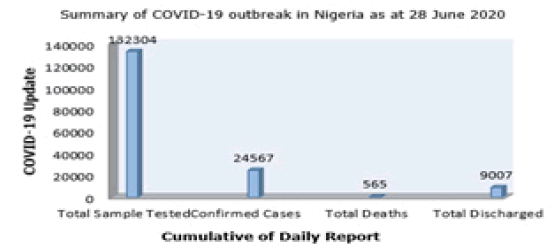
Figure 1: Summary of Coronavirus (COVID-19) Situation in Nigeria as at 28 June 2020.
As the number of cases grew exponentially nationwide in that Nigeria now leads in both infections and death rates in West Africa and local transmission surged relative to the number of imported cases, probably from the 11 cases who disappeared to an unknown location or from the low testing due to shortage of test kits [8,12,17-19]. These scenarios among others informed the decision to assess COVID-19 pandemic situation in Nigeria from the global perspective. Consequently, due to the adverse implications of COVID-19 on people’s health and economy as well as the urgent need for total eradication of the virus, it becomes expedient to assess Nigerian situation from the global perspective owing to the experts view about COVID-19 spreading to Africa, due to obvious inadequacies of the healthcare systems in the continent, also to identify the reason why WHO regional office for Africa predicted that about two hundred thousand deaths might be recorded in Africa if effective measures were not taken by the authorities [14,9]. More so, assessing the situation will help to unveil loop holes of containment measures in the country and more promising means of combating the disease in the future. This paper thus, assessed COVID-19 pandemic situation in Nigeria from the global perspective.
Graphical presentation of covid 19 pandemic in Nigeria
The figure above represents the surge in the reported cases of COVID-19 and death of the patients, across the country such that as of 28 June 2020 which is four months from the index case, Nigeria has recorded 24567 total number of confirmed cases of COVID-19 with 565 deaths and discharged 9007 persons out of 132304 total test carried out in the African most populous country (Figure 1).
Assessing the trend of covid-19 occurrence within four months outbreak in Nigeria
COVID-19 outbreak in Nigeria as observed earlier occurred on 28th February, 2020 in Lagos one of the most populous state in Nigeria [16]. As at first one month of the outbreak the number of cases was gradual with one record of death and number of cases, below emergency threshold. However surges of daily increase in the number of new cases began to occur from the 21st April 2020, when the country began to record above 100 cases daily with the number of confirmed cases rising steadily to emergency level. On 28 June 2020, Nigeria recorded its highest daily COVID-19 tally, with the figure 779 cases [4]. The graph were sequentially arranged month-by-month in respectively, beginning from the date of the index case to 28 June being the 4 months of the outbreak of coronavirus in Nigeria (Figures 2-6).

Figure 2: Indicates the cumulative growth of daily COVID-19 confirmed cases in Nigeria from 28 February â?? 28 March 2020.
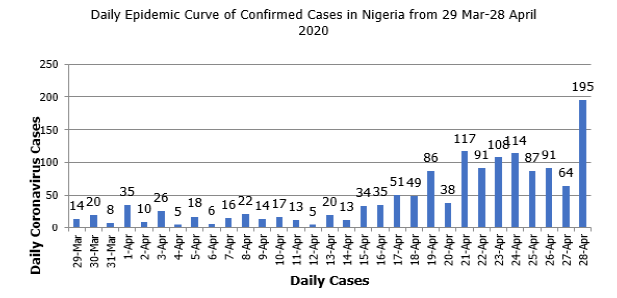
Figure 3: Indicates the daily cumulative growth of COVID-19 confirmed casesin Nigeria from 29 Marchâ??28 April 2020.
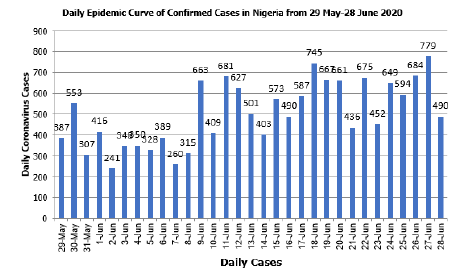
Figure 4: Indicates the daily cumulative growth of COVID-19 confirmed cases in Nigeria from 29 Aprilâ??28 May 2020.
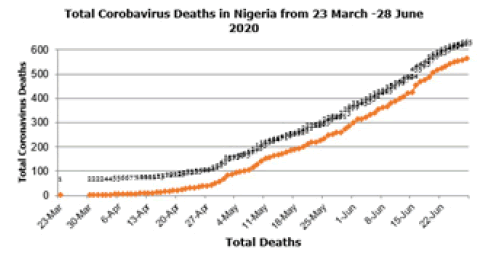
Figure 5: Indicates the daily cumulative growth of COVID-19 confirmed cases in Nigeria from 29 Mayâ??28 June 2020.
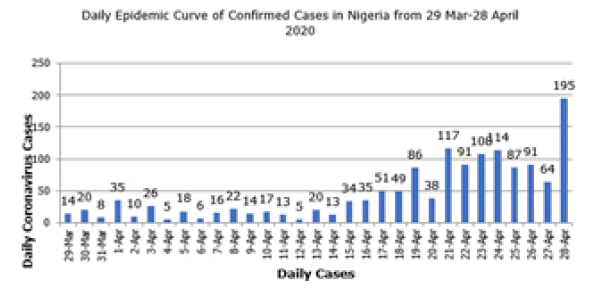
Figure 6: Above indicated the cumulative COVID-19 deaths from 23 March Nigeria recorded first death-28 June 2020 as of this writing.
The data in figure 6 above shows the trend of the COVID-19 deaths in the country. The graph indicated the cumulative number of deaths starting from 23 March when Nigeria recorded the first death of COVID-19. However, within three months and seven days i.e. 28 June 2020 as of this writing the total fatality has risen to 556. The surge in the number of daily cases of the novel virus as could be seen in pointed to the possibility of more deaths and these underscores the need to intensify prevention and control efforts in the country (Figures 2-5).
Evaluating Nigeria covid-19 situations from the global dimensions
The COVID-19 pandemic which emerged in the Hubei province of China in December 2019 has become one of the most traumatic pandemics in contemporary times with implications not only on morbidity and mortality of humans but in the overall economic survival of the entire planet [20]. The novel virus has remained a major public health crisis ravaging besides China all countries around the world, Nigeria inclusive [21]. The global COVID-19 situation by WHO region is hereby summarized in Figure 7.

Figure 7: The COVID-19 global Situations by WHO Region as at 28 June 2020.
Data in represented total COVID-19 confirmed cases and deaths in the respective WHO regions and the global summary as at 28 June 2020. Globally, a total of 9843073 confirmed cases were reported worldwide with 495760 deaths as at 28 June 2020 (Figure 7). Specifically, the graph indicated that Western Pacific recorded 213032 confirmed cases with 7420 deaths, South-East Asia confirmed a total of 735854 cases with 20621 deaths, Europe recorded 2656437 confirmed cases with 196541, Eastern Pacific confirmed a total of 1024222 cases with 23449 deaths, Americas recorded 4933972 confirmed cases with 241931 deaths while in Africa a total of 278815 confirmed cases with 5785 deaths was reported at the same time.
Data Figure 8 above shows the COVID-19 situations in the selected countries from the respective WHO regions with African countries recording lower cases of COVID-19 as at 28 June 2020. Specifically, USA with 2452048 confirmed cases had recorded 124811 deaths; India with 528859 confirmed cases recorded 16095 deaths, Indonesia with 52812 confirmed cases recorded 1385, New Zealand with 1176 confirmed cases recorded 22 deaths, Ecuador with 54574 confirmed cases recorded 718 deaths, Egypt with 63923 confirmed cases recorded2908 deaths, China with 85190 confirmed cases recorded 4048 deaths, Nigeria with 24017 confirmed cases recorded 558 deaths, South African with 131800 confirmed cases recorded 2413 deaths, Ghana with 16431 confirmed cases recorded 103 deaths, Cote d’ivoire with 8944 confirmed cases recorded 66 deaths, Kenya with 5811 confirmed cases recorded 141 deaths, Ethiopia with 5570 confirmed cases recorded 74 deaths. Madagascar with 2005 confirmed cases recorded 16 deaths. However, African countries recording lower cases of COVID 19 might not be unconnected to the number of laboratory tests conducted accordingly, see Figure 9.
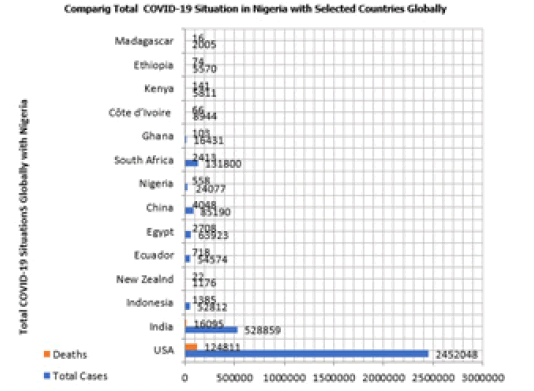
Figure 8: Comparing Total COVID-19 Situations in selected countries by WHO Region with Nigeria as at 28 June 2020.
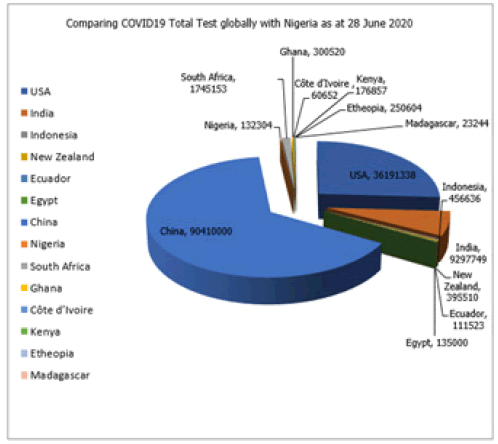
Figure 9: Comparing Total COVID-19 Test Situation in selected countries by WHO Region with Nigeria as at 28 June 2020.
The above data in represented the total test situation conducted in the globally selected WHO regional countries as of June 28, 2020. Specifically, USA had conducted 36191338 (~10.96%) tests; India 9297749 (~0.68%) tests; Indonesia 456636 (~0.17%) tests; New Zealand 395510 (~7.91%) tests; Ecuador 111523 (~0.64%) tests; Egypt 135000 (~0.13%) tests; China 90410000 (~6.46%) tests; Nigeria 132304 (~0.07%)tests; South Africa 1745153 (~3%) tests; Ghana 300520 (~0.99%) tests; Cote d’Ivoire 60652 (~0.24%) tests; Kenya 176857 (~0.33%) tests; Ethiopia 250604 (~0.22%) tests and Madagascar 23244(0.09%) tests (Figure 9).
Assessing the Summary of total COVID-19 Test, Confirmed Cases, deaths and the Population of selected countries by WHO Region with Nigeria as at 28 June 2020 as represented in the graph and bar chart above is as follows: India with a population of 1.36 billion had conducted 9297749 (~0.68%)total tests and confirmed 528859 COVID-19 cases with 16095 deaths. USA with a population of 330,237,000 had conducted 36191338 (~10.96%) total tests and confirmed 2452048 COVID-19 cases with 124811 deaths. China with a population of 1.4 billion had conducted 90410000(~6.46%) tests and confirmed 85190 COVID-19 cases with 4048 deaths. Ghana with a population of 30,281,000 people had conducted 300520 (~0.99%) tests and confirmed 16431 COVID-19 cases with103 deaths. Egypt with a population of 101.9 million people had conducted 135000 (~0.13%) tests and confirmed 63923 COVID-19 cases with 2908 deaths. Ecuador with a population of 17,336,000 people had conducted 111523 (~0.64%) tests and confirmed 54574 cases with 718 deaths. Kenya with a population of 53.5 million people had conducted 176857 (~0.33%) tests and confirmed 5811 cases with141 deaths. Ethiopia with a population of 112,000,000 million people had conducted 250604(~0.22%) tests and confirmed 5570 COVID-19 cases with 74 deaths. Côte d'Ivoire with a population of 25,717,000 people had conducted 60652 (~0.24%) tests and confirmed 8944 COVID-19 cases with 66 deaths. New Zealand with a population of 5,002,000 people had conducted 395510 (~7.91%) tests and confirmed 1176 COVID-19 cases with 22 deaths. Indonesia with a population of 270,000,000 people had conducted 456636 (~0.17%) tests confirmed 52812 COVID-19 cases with 1385 deaths. Madagascar with the population of 26969000 had conducted 23244 (0.16%) tests and confirmed 2005 cases with 16 deaths. South Africa with a population of 59.1 million people had conducted 1745153 (~3%) tests and confirmed 131800 COVID-19 cases with 2413 deaths and Nigeria with a population of 201,000,000 million people had conducted 132304 tests (~0.07%) and confirmed 24077 COVID-19 cases with 558 deaths [4,22].
The assessment of this study show that as of 28th June 2020, the four months of the index case in Nigeria, Nigeria amongst the selected countries within the WHO regions under this study recorded the lowest in percentage number of the population tested (~0.07%), far below zero point (0.5%) of the entire population of Nigeria compared to its African counterpart, the Republic of South Africa with 59 million one hundred thousand population size but covered approximately 3% of its entire population let alone the United States of America which ranks the highest with approximately 10.96% of its population covered. The number of total test in Nigeria was far lower than the population of the country compared with other countries globally. This alone has unveiled the worrisome condition of Nigeria preparedness towards tackling emergency health challenges of this nature. The situation also affirmed the expert view which predicted that about two hundred thousand deaths might be recorded in Africa including Nigeria, if effective measures were not taken by the authorities [9,11,14].
Experts have observed that more testing is the key to combating the spread of COVID-19 pandemic [23, 12]. A study published in the Journal of the American Medical Association (JAMA), titled, "Response to COVID-19 in Taiwan Big Data Analytics, New Technology, and Proactive Testing" has identified improving the capacity to test as one of the major secret for their success in containing the virus. Given its proximity to Mainland China and the large number of individuals who frequently travel back and forth between the countries, Taiwan was at risk of having the second-highest number of imported COVID-19 cases, according to a model developed by researchers at Johns Hopkins University and the University of New South Wales Sydney. News reports indicate that each year, about 60,000 flights carry 10 million passengers between Taiwan and China. But after the first reports emerged of the infection in Wuhan, China, "Taiwan quickly mobilized and instituted specific approaches for case identification, containment, and resource allocation to protect the public health". Studies have indicated that the country has managed to contain the outbreak of COVID-19 following their aggressive actions towards speedy response to the recognition of a novel coronavirus in Taiwan, compared to recognition of the same novel coronavirus in Nigeria [23].
There are concerns about the shortage of COVID-19 test Kits in the country which have continued to threaten the chances of the patient's survival and containment of the spread of the virus. The situation has created panic, as most people want to get tested as soon as possible but cannot be tested due to shortage of test kits [18,19]. The situation has become worse as Director-General and Chief Executive Officer of NCDC, Dr. ChikweIhekweazu, disclosed that most Nigerians are besieging the center asking to get tested where the country cannot do so as they are only focusing on those with the symptoms due to shortage of test kits [18]. Muanya observed that the same fear informed the recent decision of the United States government to commence evacuation of her citizens in Nigeria over a possible escalation of coronavirus (COVID-19) in the country as the exact number of Nigerians exposed to the dreaded virus could not be determined hence possible victims to COVID-19 mingle freely with people [18]. The Kano, Nigeria's second-most-populous state, has recorded a spike in cases of COVID-19 over the past few days and now has the second-highest number of cases in Nigeria with more than 600 deaths within the fortnight, authorities in the city of 5 million denied that COVID-19 was a major issue, calling a surge in deaths "mysterious" and attributing them to other illnesses. But health workers on the ground offer a different story. They observed that the rate at which people are dying is abnormal in a city where many have disregarded social distancing measures [24-26]. Also report released on the 15th of March has it that there was a deliberate mass movement of people (Almajiris) from the Northern (more affected areas as it were) parts to the southern part of the country which sparked a lot of media outcries, inferring that the (Almajiris) were used as vectors for spreading the virus to the less affected regions as some of them were reported to have tested positive to the virus [27-30].
The outbreak of COVID-19 pandemic is an ongoing crisis that is causing global uncertainty in an unprecedented scale. The event of this pandemic has made it a notorious fact that Nigeria's health system is below standard and there is no obvious widespread preparedness for emergency health challenges let alone tackling issues of the pandemic as evidenced by poor testing, poor provision of palliatives, the level of discordances on social distancing guidelines between citizens, some stakeholders at different levels and government. Hence the need that this obvious reckless abandonment of the health sector by various governments should be addressed immediately using the present situation as an eye-opener to averting more health catastrophes in the future; the health sector should be allocated the due budgetary needs instead; health is wealth and prioritizing it is not inadequate! Although the pandemic came unannounced, the role of integrated knowledge translation (carrying people along at all stages of planning to execution) ab- initio on the implementation of the outlined strategies should not be swept under the carpet since people at all levels have different perceptions and play key roles in achieving positive results in the fight against COVID-19, and not just engaging them only at the implementation stage if they have to assume the ownership of the strategy (policy). This is because many (including religious leaders and community leaders) are yet to comprehend the validity and truism of the pandemic. This supports the view that "effective and timely management of infections are greatly dependent on social distancing behavior; perception plays a vital role in the adoption of protective behavioral response", therefore, the failure of people to queue on the implementation strategies is the beginning of the failure in the entire processes. Again, the leadership of the drive to containing this pandemic should be headed by the health professionals at all levels and not the politicians in order to guarantee trust by the implementers who are already biased on the integrity of politicians (Nigeria context).
Citation: Nwankwo O et al. Covid-19 Pandemic: A Systematic Review of Nigeria Situation from the Global Perspective between February to June 2020 of the Outbreak Int. J. Collab. Res. Intern. Med. Public Health. 2022, 14 (09), 001-005
Received: 08-Sep-2022, Manuscript No. IJCRIMPH-22-72542; Editor assigned: 10-Sep-2022, Pre QC No. IJCRIMPH-22-72542(PQ); Reviewed: 15-Sep-2022, QC No. IJCRIMPH-22-72542(Q); Revised: 19-Sep-2022, Manuscript No. IJCRIMPH-22-72542(R); Published: 30-Sep-2022, DOI: 10.35248/1840-4529.22.14.9.384
Copyright: © 2022 Nwankwo O. This is an open-access article distributed under the terms of the Creative Commons Attribution License, which permits unrestricted use, distribution, and reproduction in any medium, provided the original author and source are credited.